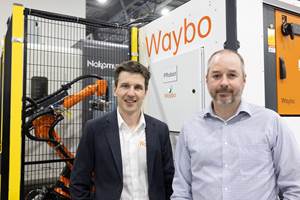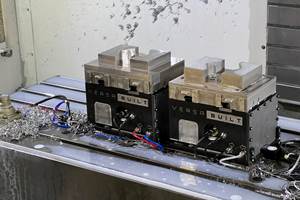Show Me the Fixtures
Innovative workholding devices intrigue me. If you’ve developed what you consider to be a nifty workholding solution of your own, I’d like to see it.
Share




I appreciate that we cover a range of machining topics in this magazine and, in doing so, get to visit a variety of shops. Regardless of the article topic, however, I’m always curious to see how shops fixture parts for machining.
It’s interesting to see unique workholding devices a clever person has created for odd parts. But it’s just as neat to see custom devices that provide a more effective way to secure parts with straightforward geometries. Mike Brown, the vice president of manufacturing at E.F. Bavis, has developed a number of interesting job-specific fixtures over the years for both scenarios. I got to see some of those when I met with him to develop the story that starts on page 88. Plus, each of his three CNC toolroom mills has a pin in the center of the table onto which the fixtures are located. This speeds changeovers by eliminating the need to indicate fixtures before starting a job.
One of the niftiest workholding solutions I’ve come across is nicknamed the “lollipop” and was developed by Harmonic Drive LLC. The company needed to secure small, bell-shaped workpieces called flexsplines for turning, spline machining and OD inspection. The part, which begins as a 15-5PH stainless steel forging, first has its ID turned. This creates a wall thickness of approximately 0.06 inch. A final wall thickness of 0.01 inch is attained through OD turning. Because of the part’s shape and extremely thin wall thickness at this stage, it can’t be clamped in a lathe’s chuck. The thin walls would not provide adequate support during the turning operation.
To solve its workholding dilemma, the company decided to machine an arbor from a Sandvik Capto boring bar blank onto which the flexspline can be mounted. However, because of the part’s bell-like internal profile, voids exist between the arbor and inner surface of the workpiece. To fill these voids, the shop pours a low-melt-temperature alloy through a bore down the center of the arbor. Once the alloy fills the voids and solidifies, the part and arbor bond together to become one piece. Therefore, the alloy provides the internal wall support required to turn the part’s OD to the desired wall thickness. After all machining and inspection operations are completed, the alloy is melted away and the completed flexspline is removed from the arbor.
Of course, many job shops approach new projects expecting to use a vise. This is understandable, because these universal devices enable them to accommodate the wide range of parts they encounter. So while a vise might not be the ideal workholding solution, shops justify them because it can be impractical, too costly or time consuming to engineer and make custom fixtures for a job they may never see again.
Conversely, other shops have found value in making the investment to create custom workholding devices. In fact, some have gone on to turn their ideas into marketable products. If you’ve developed such a workholding solution and would like to crow about it, send me a photo and brief description. If I receive enough examples, I’ll share them with our readers.
Related Content
Shop Doubles Sales with High-Mix, Low-Volume Automation
Robots with adaptive grippers have opened entire shifts of capacity to high-mix, low-volume shop Précinov, doubling its sales.
Read MoreWorkholding Fixtures Save Over 4,500 Hours of Labor Annually
All World Machinery Supply designs each fixture to minimize the number of operations, resulting in reduced handling and idle spindle time.
Read MoreUsing Jaws as Grippers Enables Flexible, Low-Cost Automation
VersaBuilt’s automation systems significantly boosted Innovative Fabrication’s revenue. In return, the shop has helped VersaBuilt optimize its products.
Read MoreUsing Automation to Reduce COGS and Stay Globally Competitive
Decade-long, multiphase automation investments lower operating costs and maintain technology lead in an increasingly competitive global market.
Read MoreRead Next
Setting Up the Building Blocks for a Digital Factory
Woodward Inc. spent over a year developing an API to connect machines to its digital factory. Caron Engineering’s MiConnect has cut most of this process while also granting the shop greater access to machine information.
Read MoreBuilding Out a Foundation for Student Machinists
Autodesk and Haas have teamed up to produce an introductory course for students that covers the basics of CAD, CAM and CNC while providing them with a portfolio part.
Read More5 Rules of Thumb for Buying CNC Machine Tools
Use these tips to carefully plan your machine tool purchases and to avoid regretting your decision later.
Read More
















.jpg;maxWidth=300;quality=90)















